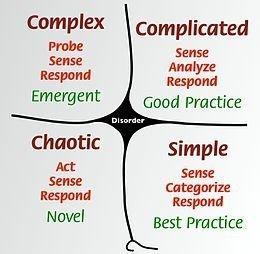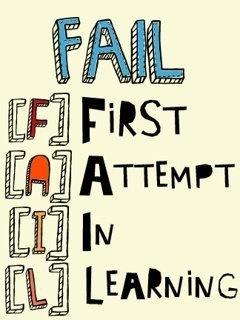
Cynefin and the Art of Failing Forward
At the age of 30, with only $106 in his bank account, Sylvester Stallone turned down an offer of $300,000 for the rights to “Rocky.”
He wanted the film to be made on his own terms, and for him to play the starring role. The rest is history. Sylvester Stallone’s self-belief paid off big time. Rocky won 3 academy awards, and the franchise has brought in over a billion dollars.
Stories like these garner much media attention. We all love the underdog, and want to believe that if you follow your dreams, and risk everything, that the universe will be kind in return.
But the truth is, the universe isn’t so kind to people who take risks. 90% of start-up companies fail. And for those who invest everything in following their dreams, the consequence of doing so is more often than not, quite devastating.
So what is the real message that should be celebrated? That we shouldn’t take risks, and instead live lives of security and mediocrity? Hell no! The useful message lies somewhere between these extremes.
The real message we should celebrate and embrace is that we need to balance our efforts – we definitely do need to take risks, and be willing to fail, but we need to do so in a safe-to-fail manner.
According to the Cynefin model, by Dave Snowden, there are different types of problems that we all need to face in life and business, each requiring a different approach:

Simple problems are those in which a good solution can be found without much effort. For example, if your car is running low on fuel, take it to the petrol station. Simple.
Complicated problems are ones in which a good solution can also be found, but requires some analysis, and domain expertise. For example, if you are having car problems, a mechanic may run several tests to identify the issue. Similarly, to build a bridge requires engineering knowledge – but generally a good solution can be identified through analysis.
Complex problems in contrast, are ones in which there are too many variables at play, or in which our understanding is limited. For complex problems, we need to experiment to see what works and what doesn’t. There is no other choice.
Chaotic problems… well…. that is a discussion for another time.
What most of us don’t realise, but is important to understand, is that many if not most of the decisions we face in business or in our personal lives are complex in nature. Around 2/3 of marriages end in divorce, not many of us know how to be the perfect parent, many of us don’t really know how to be happy (suicide is now the leading cause of death in Australians aged between 15 and 44), and in business, it is hard to predict what innovations are around the corner, or exactly what our customers will think about our ideas until we test them out.
The message from Dave Snowden’s work is that in order to deal with such complexity, we do need to experiment, and embrace failure (and support this process in the workplace)… but importantly, we need to conduct such experiments in a safe-to-fail manner. Don’t put all your eggs in one basket, as the idiom goes.
For example, not every product that Google releases is a success (e.g., ever heard of "google wave" - aimed at replacing email?). The point is, that Google explores many products in parallel, some which fail, and some which succeed. But they can afford to do this, from the revenues from their successful projects. It is very much safe-to-fail exploration.
Many of us don't succeed in our goals because we do not explore and are inflexible in our thinking. We assume our problems are simple or complicated and that we should know the right answer. We think we are experts, in domains where there are none.
The alternative is Shoshin – a concept in Zen Buddhism meaning “beginner’s mind.” As Zen teacher Shunryu Suzuki wrote “in the beginner’s mind there are many possibilities, in the expert’s mind there are few.”
If you are struggling with areas of your life or business – take a beginner’s mind approach. Focus on what positive future you wish to head towards, and actively experiment, taking time to reflect upon what you wanted to achieve, what worked and what didn’t, and what you might try next time. But don't forget, experiments need to be safe-to-fail.
If you want help in this process, hire a coach, as this is the essence of coaching conversations – devoting explicit time in your weekly routine for active experimentation and reflection, helping you navigate your way through complexity towards a life well-lived.
Best wishes in your travels ahead!
Trending
-
1 Jocko Willink's Inspirational Life & Net Worth
Aaqil Ashraf -
2 How Art Shapes Culture and Reflects Human Experience
Luke Fitzpatrick -
3 Meet Felix Williams and Maria Arthuer: The Parents of World Class Winger Nico Williams
Felix Yim -
4 Kai Cenat's Dad and the Enduring Public Interest
Aaqil Ashraf -
5 London Tube Stations Closed as Workers Stage Strikes
Mihir Gadhvi






Comments